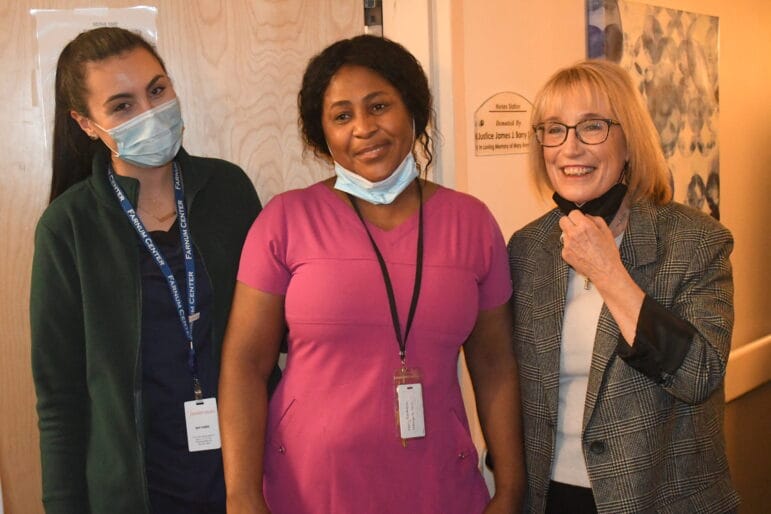Hassan, Craig discuss opioid treatment approaches at Farnum Center
On Monday, U.S. Senator Maggie Hassan (D-NH) joined Manchester Mayor Joyce Craig and other local mental health and substance abuse experts at the Farnum Center to discuss the impact of medication assisted treatment toward fighting the state’s opioid epidemic.

MANCHESTER, N.H. – On Monday, U.S. Senator Maggie Hassan (D-NH) joined Manchester Mayor Joyce Craig and other local mental health and substance abuse experts at the Farnum Center to discuss the impact of medication assisted treatment toward fighting the state’s opioid epidemic.
Following a tour of the facility, Hassan sat down with the roundtable of experts to explore future steps that can be taken following the recent appropriation of funding within the end of the year omnibus spending bill. A version of Hassan’s Mainstreaming Addiction Treatment Act and Opioid Workforce Act were included inside the omnibus, the former making it easier for individuals to prescribe life-saving medication-assisted treatment for opioid abuse disorder and the latter increasing the number of medical residency positions across the U.S.
Hassan told the experts she learned that 40 percent of counties across the United States currently have no individuals who can provide medication-assisted treatment for opioid abuse.
“This is an illness that strikes people from all walks of life from every neighborhood,” she said.
Craig was grateful to Hassan for the federal assistance on the issue of supporting those facing opioid addiction. She noted that approximately half of opioid overdoses came from the people without fixed residences and that the funding from Washington not only helps those people in need, but also provides individualized treatment plans for those who need support, which she said helps reduce criminal activity and increases a person’s likelihood of continuing treatment.
“We need to use every tool in our toolbox to address substance abuse disorder, and this (funding) helps maintain a critical component for that,” she said.
Craig also mentioned the recent hiring of a new overdose prevention manager working within the Manchester Health Department through CDC funding as well as teams that help with rapid outreach to individuals at risk of overdoses and other communities in crisis.
Some experts on the panel also discussed the importance of another significant issue facing the city that they believe is interconnected to opioid abuse, even though that connection is often overlooked: affordable housing.
Craig responded that the city currently has approximately 2,000 more apartments planed. Approximately 20 percent of those apartments, such as the ones at the former Manchester Police Department Headquarters, are classified as affordable housing. She also said that the city is looking for other ways to address affordable housing such as using hotels to provide more services.
However, she reiterated the concern that the state has not done enough to help in regard to housing, something Hassan also echoed in her conversations with other mayors across the state.
“We’re looking at creative ways to increase housing, but one thing I’ve been consistent with is that Manchester can’t do it alone,” she said.
Other concerns from the experts included more flexibility with federal funding to address needs related to opioid abuse, an increased look integrating non-medical approaches with medically assisted treatment, and a need to address more holistic concerns related to substance abuse such as addressing related illnesses, and the impact on the families and friends of those afflicted.





